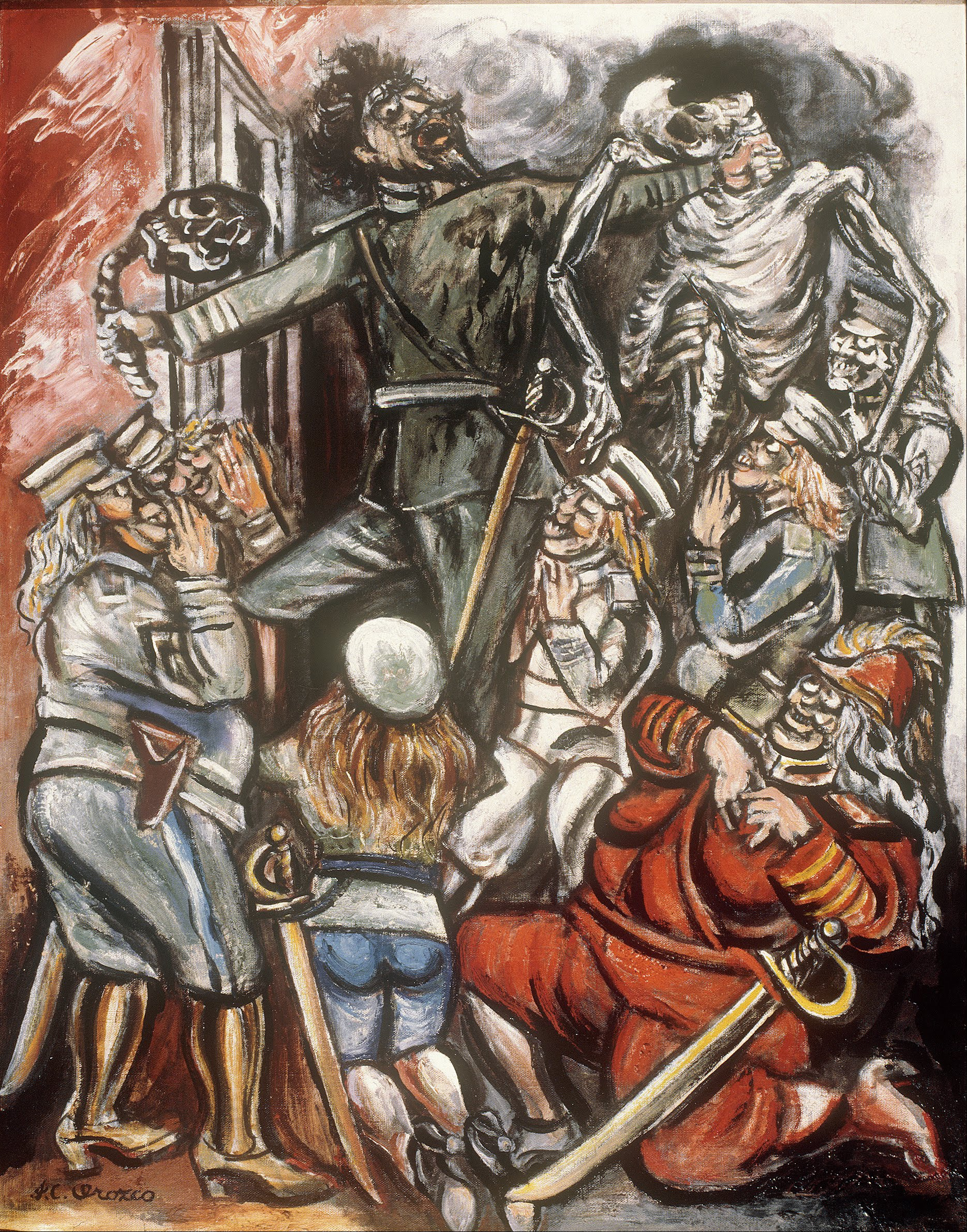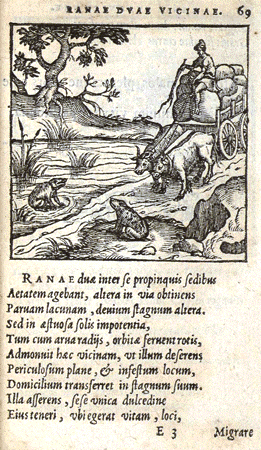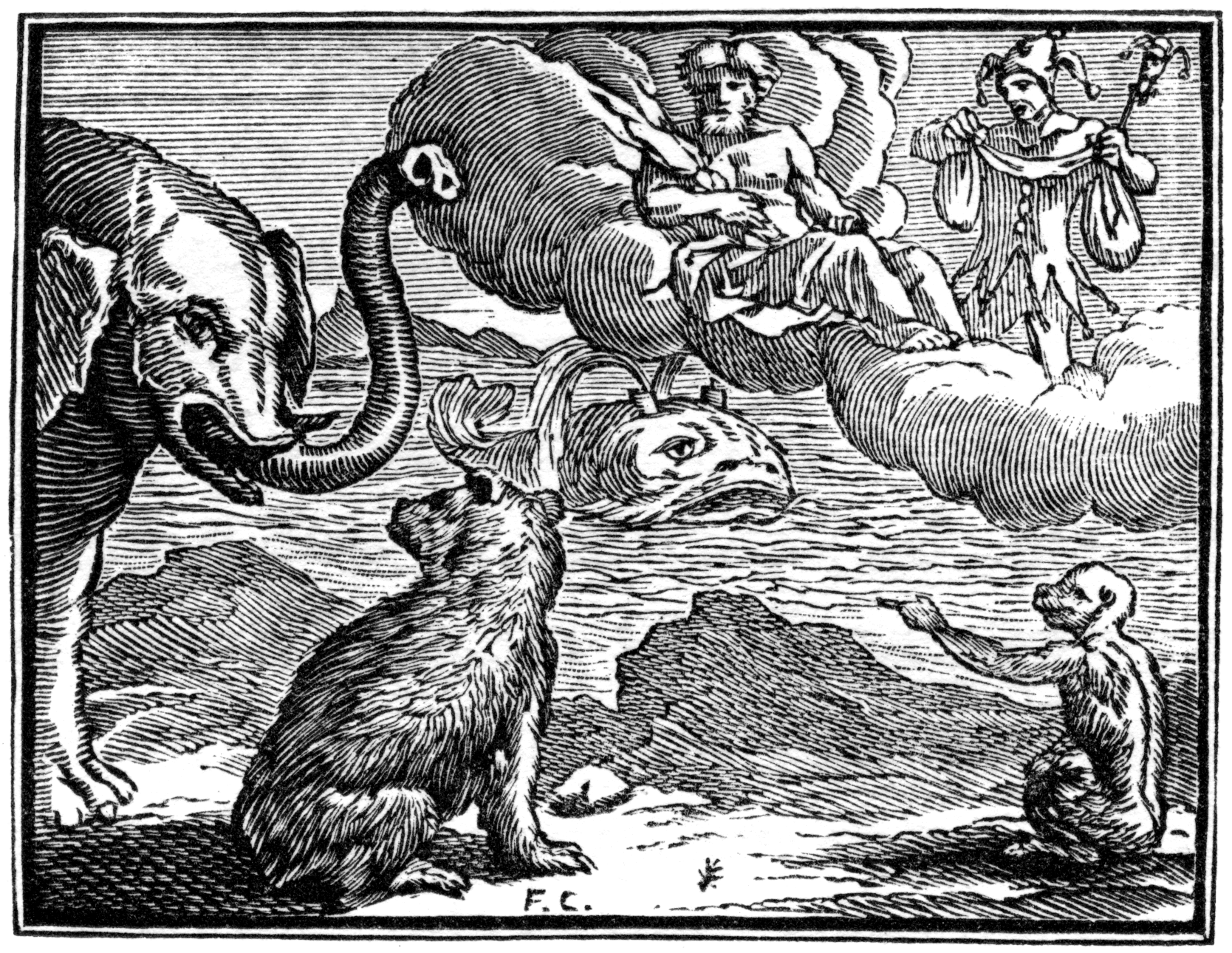|
The Fox, The Flies And The Hedgehog
The fable of The Fox, the Flies and the Hedgehog is ascribed to Aesop’s Fables. From its beginning it was applied satirically to political leaders and is numbered 427 in the Perry Index. The fable An enfeebled fox is plagued by flies, ticks or mosquitoes, of which a hedgehog offers to rid her. The fox refuses such help on the grounds that the insects have already gorged themselves on her blood and hardly trouble her now, but they would inevitably be succeeded by new swarms if removed. The fable is mentioned by Aristotle in his work on Rhetoric (II.20) as an example of Aesop’s way of teaching a political lesson through a humorous example. The context in this case was said to be the trial of a demagogue; Aesop pointed out that, since self-interested politicians are a necessary evil, to replace one who has already exploited the state with others who have yet to satisfy their greed would only make the situation worse. The reason for the fox’s enfeebled state is that, while cro ... [...More Info...] [...Related Items...] OR: [Wikipedia] [Google] [Baidu] |
Aesop’s Fables
Aesop's Fables, or the Aesopica, is a collection of fables credited to Aesop, a slave and storyteller believed to have lived in ancient Greece between 620 and 564 BCE. Of diverse origins, the stories associated with his name have descended to modern times through a number of sources and continue to be reinterpreted in different verbal registers and in popular as well as artistic media. The fables originally belonged to oral tradition and were not collected for some three centuries after Aesop's death. By that time, a variety of other stories, jokes and proverbs were being ascribed to him, although some of that material was from sources earlier than him or came from beyond the Greek cultural sphere. The process of inclusion has continued until the present, with some of the fables unrecorded before the Late Middle Ages and others arriving from outside Europe. The process is continuous and new stories are still being added to the Aesop corpus, even when they are demonstrably more ... [...More Info...] [...Related Items...] OR: [Wikipedia] [Google] [Baidu] |
Perry Index
The Perry Index is a widely used index of "Aesop's Fables" or "Aesopica", the fables credited to Aesop, the storyteller who lived in ancient Greece between 620 and 560 BC. The index was created by Ben Edwin Perry, a professor of classics at the University of Illinois Urbana-Champaign. Modern scholarship takes the view that Aesop probably did not compose all of the fables attributed to him;D. L. Ashliman, “Introduction,” in George Stade (Consulting Editorial Director), ''Aesop’s Fables.'' New York: Barnes & Noble Classics, (2005). Produced and published in conjunction with Fine Creative Media, Inc. (New York) Michael J. Fine, President and Publisher. See pp. xiii–xv and xxv–xxvi. indeed, a few are known to have first been used before Aesop lived, while the first record we have of many others is from well over a millennium after his time. Traditionally, Aesop's fables were arranged alphabetically, which is not helpful to the reader. Perry listed them by language (Greek ... [...More Info...] [...Related Items...] OR: [Wikipedia] [Google] [Baidu] |
Aristotle
Aristotle (; grc-gre, Ἀριστοτέλης ''Aristotélēs'', ; 384–322 BC) was a Greek philosopher and polymath during the Classical period in Ancient Greece. Taught by Plato, he was the founder of the Peripatetic school of philosophy within the Lyceum and the wider Aristotelian tradition. His writings cover many subjects including physics, biology, zoology, metaphysics, logic, ethics, aesthetics, poetry, theatre, music, rhetoric, psychology, linguistics, economics, politics, meteorology, geology, and government. Aristotle provided a complex synthesis of the various philosophies existing prior to him. It was above all from his teachings that the West inherited its intellectual lexicon, as well as problems and methods of inquiry. As a result, his philosophy has exerted a unique influence on almost every form of knowledge in the West and it continues to be a subject of contemporary philosophical discussion. Little is known about his life. Aristotle was born in th ... [...More Info...] [...Related Items...] OR: [Wikipedia] [Google] [Baidu] |
Rhetoric (Aristotle)
Aristotle's ''Rhetoric'' ( grc, Ῥητορική, Rhētorikḗ; la, Ars Rhetorica) is an ancient Greek treatise on the art of persuasion, dating from the 4th century BCE. The English title varies: typically it is titled ''Rhetoric'', the ''Art of Rhetoric'', ''On Rhetoric'', or a ''Treatise on Rhetoric''. Background Aristotle is generally credited with developing the basics of the system of rhetoric that "thereafter served as its touchstone", influencing the development of rhetorical theory from ancient through modern times. The ''Rhetoric'' is regarded by most rhetoricians as "the most important single work on persuasion ever written." Gross and Walzer concur, indicating that, just as Alfred North Whitehead considered all Western philosophy a footnote to Plato, "all subsequent rhetorical theory is but a series of responses to issues raised" by Aristotle's ''Rhetoric''. This is largely a reflection of disciplinary divisions, dating back to Peter Ramus' attacks on Aristotelian r ... [...More Info...] [...Related Items...] OR: [Wikipedia] [Google] [Baidu] |
Demagogue
A demagogue (from Greek , a popular leader, a leader of a mob, from , people, populace, the commons + leading, leader) or rabble-rouser is a political leader in a democracy who gains popularity by arousing the common people against elites, especially through oratory that whips up the passions of crowds, appealing to emotion by scapegoating out-groups, exaggerating dangers to stoke fears, lying for emotional effect, or other rhetoric that tends to drown out reasoned deliberation and encourage fanatical popularity. Demagogues overturn established norms of political conduct, or promise or threaten to do so. Historian Reinhard Luthin defined ''demagogue'' as "...a politician skilled in oratory, flattery and invective; evasive in discussing vital issues; promising everything to everybody; appealing to the passions rather than the reason of the public; and arousing racial, religious, and class prejudices – a man whose lust for power without recourse to principle leads him to see ... [...More Info...] [...Related Items...] OR: [Wikipedia] [Google] [Baidu] |
Gabriele Faerno
The humanist scholar Gabriele Faerno, also known by his Latin name of Faernus Cremonensis, was born in Cremona about 1510 and died in Rome on 17 November, 1561. He was a scrupulous textual editor and an elegant Latin poet who is best known now for his collection of Aesop's Fables in Latin verse. Life Gabriele Faerno was born in Cremona to Francis Faerno, a local lawyer and scholar. In 1528 he was enrolled at the Collegium Notariorum in his hometown and then entered the service of the Bishop of Cremona. Biographical details for this period are sparse, except that in 1538 he is recorded as following his master on a mission to Barcelona in Spain. At some time in the next decade he was recommended by his sponsors to Rome. The first evidence of his presence in the city is in a letter from Carlo Gualteruzzi to Giovanni Della Casa in October, 1548. At the start of 1549 he began working in the Vatican Library and was brought into contact with many of the scholars and philologists who gravi ... [...More Info...] [...Related Items...] OR: [Wikipedia] [Google] [Baidu] |
Samuel Croxall
Samuel Croxall (c. 1690 – 1752) was an Anglican churchman, writer and translator, particularly noted for his edition of Aesop's Fables. Early career Samuel Croxall was born in Walton on Thames, where his father (also called Samuel) was vicar. He was educated at Eton and at St John's College, Cambridge, where he took his B.A. in 1711 and entered holy orders. Soon after graduating he began to emerge as a political pamphleteer, taking the Whig side on the question of the Hanoverian succession. In 1713 he published ''An original canto of Spencer: design'd as part of his Faerie Queene, but never printed'', followed next year by ''Another original canto of Spencer''. Croxall's satirical target was the Tory politician of the day, Robert Harley, Earl of Oxford, and the choice of poetical model was also politically motivated. In 1706 the Whig turncoat Matthew Prior had used the Spenserian stanza in ''An Ode, Humbly to the Queen'' on the conduct of the War of the Spanish Succession; a ... [...More Info...] [...Related Items...] OR: [Wikipedia] [Google] [Baidu] |
La Fontaine's Fables
Jean de La Fontaine collected fables from a wide variety of sources, both Western and Eastern, and adapted them into French free verse. They were issued under the general title of Fables in several volumes from 1668 to 1694 and are considered classics of French literature. Humorous, nuanced and ironical, they were originally aimed at adults but then entered the educational system and were required learning for school children. Composition history Divided into 12 books, there are 239 of the ''Fables'', varying in length from a few lines to some hundred, those written later being as a rule longer than those written earlier. The first collection of ''Fables Choisies'' had appeared March 31, 1668, dividing 124 fables into six books over its two volumes. They were dedicated to ''"Monseigneur"'' Louis, ''le Grand Dauphin'', the six-year-old son of Louis XIV of France and his queen consort Maria Theresa of Spain. By this time, La Fontaine was 47 and known to readers chiefly as the aut ... [...More Info...] [...Related Items...] OR: [Wikipedia] [Google] [Baidu] |
Hunting
Hunting is the human activity, human practice of seeking, pursuing, capturing, or killing wildlife or feral animals. The most common reasons for humans to hunt are to harvest food (i.e. meat) and useful animal products (fur/hide (skin), hide, bone/tusks, horn (anatomy), horn/antler, etc.), for recreation/taxidermy (see trophy hunting), to remove predators dangerous to humans or domestic animals (e.g. wolf hunting), to pest control, eliminate pest (organism), pests and nuisance animals that damage crops/livestock/poultry or zoonosis, spread diseases (see varmint hunting, varminting), for trade/tourism (see safari), or for conservation biology, ecological conservation against overpopulation and invasive species. Recreationally hunted species are generally referred to as the ''game (food), game'', and are usually mammals and birds. A person participating in a hunt is a hunter or (less commonly) huntsman; a natural area used for hunting is called a game reserve; an experienced hun ... [...More Info...] [...Related Items...] OR: [Wikipedia] [Google] [Baidu] |
Sir Brooke Boothby, 6th Baronet
Sir Brooke Boothby, 6th Baronet (3 June 174423 January 1824) was a British linguist, translator, poet and landowner, based in Derbyshire, England. He was part of the intellectual and literary circle of Lichfield, which included Anna Seward and Erasmus Darwin. In 1766 he welcomed the philosopher Jean-Jacques Rousseau to Ashbourne circles, after Rousseau's short stay in London with Hume. Ten years later, in 1776, Boothby visited Rousseau in Paris, and was given the manuscript of the first part of Rousseau's three-part autobiographic '' Confessions''. Boothby translated the manuscript and published it in Lichfield in 1780 after the author's death, and donated the document to the British Library in 1781. The well-known portrait of Boothby by Joseph Wright of Derby, from 1781, shows him reclining in a wooded glade with a book carrying on its cover simply the name Rousseau, indicating Boothby's admiration and promotion of the writer and his work generally. Several portraits were also ... [...More Info...] [...Related Items...] OR: [Wikipedia] [Google] [Baidu] |
William Somervile
William Somervile or Somerville (2 September 167517 July 1742) was an English poet who wrote in many genres and is especially remembered for "The Chace", in which he pioneered an early English georgic. Life Somervile, the eldest son of a long established country family, was born in Staffordshire in 1677. He was a descendant of Roger de Somerville, of an English branch of the Somerville Family. William raised at the family seat of Edstone, near Wootton Wawen in Warwickshire. He was educated at Winchester College and at New College, Oxford, and then studied law at the Middle Temple. After his father's death in 1705 he lived on his estate and devoted himself to the field sports which were eventually to supply the subjects of his best-known poems. Among his friends and neighbours were the poets William Shenstone, Richard Jago and George Lyttelton, 1st Baron Lyttelton. Later he was a correspondent of Allan Ramsay and they exchanged poems. But Somervile's convivial hospitality straine ... [...More Info...] [...Related Items...] OR: [Wikipedia] [Google] [Baidu] |
_-_Foto_G._Dall'Orto_5_ago_2006.jpg)






